BIG STORY
NNPCL May Stop Petrol Import As Depots Price Nears N1,000/Ltr
Published
3 months agoon
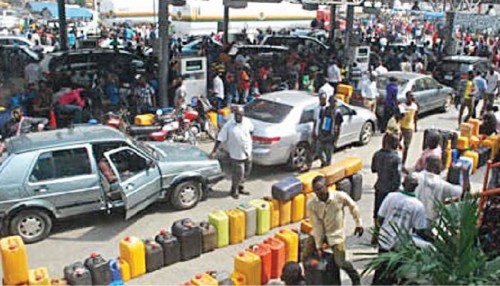
Nigeria faces a potential fuel price hike as private depot prices for Premium Motor Spirit (PMS), or petrol, have surged to N920-N950/litre.
This development coincides with protests in Abuja demanding the removal of NNPC Group Managing Director Mele Kyari due to the persistent fuel scarcity.
NNPC has alerted oil marketers to financial constraints in importing petrol, sparking concerns among dealers about a potential halt in imports.
As the sole importer of PMS, NNPCL shoulders substantial subsidies, totaling trillions of naira.
NNPC spokesperson Olufemi Soneye confirmed the financial strain, which may lead to: Higher pump prices (potentially above N1,000/litre), Prolonged fuel scarcity, and Increased economic hardship.
“NNPC Ltd faces financial strain due to PMS supply costs, impacting supply sustainability. NNPC Ltd has acknowledged recent reports in national newspapers regarding the company’s significant debt to petrol suppliers. This financial strain has placed considerable pressure on the company and poses a threat to the sustainability of fuel supply.
“In line with the Petroleum Industry Act, NNPC Ltd remains dedicated to its role as the supplier of last resort, ensuring national energy security. We are actively collaborating with relevant government agencies and other stakeholders to maintain a consistent supply of petroleum products nationwide,” Soneye stated on Sunday.
Marketers said officials from the oil company had informed petrol dealers of the development, stressing that this may further lead to a hike in the pump prices of petrol in the coming weeks.
“Now, only NNPC Trading imports petrol, and they have come out frankly to inform marketers that they can no longer sustain it, which means they are subsidising the product all this while,” the National Publicity Secretary, Independent Petroleum Marketers Association of Nigeria, Ukadike Chinedu, stated.
“Of course, the cost of petrol at the pumps may rise further in the coming weeks because up till now we are not getting enough products. So, something urgent and drastic needs to be done to tackle this challenge now.”
This came as private depots sold a litre of petrol at prices ranging from N920 to N950/litre, contrary to the position of the Nigerian Upstream and Downstream Petroleum Regulatory Authority that depots were meant to sell PMS at a stipulated price.
The spokesperson of the NMDPRA, George Ene-Ita, argued last week that the petrol price reports the regulator gets from its officials at the depots were different.
“Our depot people see a different price because we ask them to publish the prices at the depots every day and it is not N850/litre. Our field agents at the depots give us a different figure,” he said.
When told that some filling stations operated by independent marketers in Lagos and many other states dispensed their products for as high as N900 and N1,000/litre, the NMDPRA official said such outlets would be brought to book if apprehended.
“If we get these outlets, all we do is to try and shut them down, because NNPC is the company that brings in the product and they tell us how much they sell as their ex-depot prices to off-takers. And we sit down together and work out the margins and there is no way it should be that high,” Ene-Ita added.
The NMDPRA spokesman further noted that there was no way the agency could reconcile the high cost of petrol sold by independent marketers.
“Once we get these outlets, we are going to shut them down. NNPC tells us how much they sell and there is no way the pump prices should be that high. We don’t expect it to be higher than N650/litre,” he warned.
However, checks by our correspondents on Monday showed that many filling stations owned by independent marketers sold petrol close to N1,000/litre. In Kaduna, it sold for as much as N1,300/litre in some filling stations.
The National Vice Chairman of IPMAN, Hammed Fashola, disagreed with the NMDPRA, saying the regulator was not being sincere.
“I read in the news that the NMDPRA said no depot is selling at higher rates. I am not sure that should come from the NMDPRA. They are not being sincere. The NMDPRA knows what is happening because they have their officials in all the depots.
“The private depots sell to us at higher rates. If you add the cost of transportation and other expenses, the price will be higher. That’s what you see today in filling stations,” he stated.
Fashola said the cause of the price disparity between the major and independent marketers is the fact that IPMAN members do not get the product directly from NNPC, the sole importer of fuel.
According to him, the shortage in supply still lingers and the law of demand and supply has been taking place, saying higher demands have been forcing up the price of the product.
He stated that many private depots now sold petrol at N920/litre, while others sold for N950/litre.
This, he said, explained why the independent marketers, who own about 80 per cent of the filling stations in Nigeria, sell at higher rates than the major marketers.
“As of today, some depots sell at N920 and some sell at N950/litre. That’s the situation we find ourselves and that is why the price is higher in filling stations,” Fashola stated.
Fashola had charged the government to either return the fuel subsidy or remove it instead of engaging in partial deregulation.
“The Federal Government and the NNPC should just do this thing once and for all. If they want to deregulate, let them deregulate fully, because we know where we are going; that’s why you’re seeing this disparity whereby the NNPC retail is selling at N580 in Lagos and independent marketers will be selling at N900 or N800.
“You can see the gap. It’s killing our business; we are not making progress; it’s killing us,” Fashola stated.
The IPMAN official added that some of the depot owners also faced lots of challenges to get fuel from NNPC.
“The problem is that it’s only NNPC that can bring this product because of forex. They are the only ones selling. Two or three independent marketers once tried to import, but they could not.
“The depot owners we are talking about, if you are close to some of them, they will tell you what they go through too, because when the NNPC brings this product, it will not drop it at their depots. They will pay hired daughter vessels and pay some charges in dollars. So, you cannot even blame them so much. That’s the reality. The depot owners also incur some expenses,” he noted.
Meanwhile, scores of demonstrators carried banners calling for NNPC boss Kyari’s immediate dismissal.
The protest comes after NNPC admitted that its substantial debt to suppliers was endangering the sustainable fuel supply.
Chanting solidarity songs and displaying several banners that read ‘We are tired of fuel scarcity and stories on why refineries are not working, ‘No direction under Kyari’ and ‘We want accountability in the affairs of NNPCL’, the demonstrators lamented that Kyari’s tenure was marked by a dismal scorecard that raised more questions than answers.
Addressing newsmen at Unity Fountain after the rally in Abuja, Convener of the Coalition of Concerned Civil Society Organisations, Aminu Abbas, wondered why a nation blessed with oil like Nigeria would continue to suffer acute petrol scarcity.
He said, “To President Ahmed Bola Tinubu and all those in positions of power, we say the time to act is now. Show us that you stand with the people, not those who profit from our misery. Mr Kyari must be shown the way out and the NNPCL must be reformed to serve the interests of all Nigerians. We will not be silenced.
“The fuel scarcity we endure today is not just a mere inconvenience; it is a calculated perpetuation of suffering. Under Mr Kyari’s leadership, the situation has gone from bad to worse, with no end in sight. What has he done to alleviate this crisis? It is clear he seems intent on maintaining a status quo that benefits only a select few while the masses suffer.
“Why do we, the people, have to endure endless queues, inflated prices, and the daily uncertainty of whether we can fuel our vehicles or power our homes? The answer lies in the gross incompetence and mismanagement that have become the hallmarks of Mr. Kyari’s leadership.”
Human rights lawyer, Femi Falana, also raised concerns over the rising cost of living, stating that arbitrary hike in the pump price of petrol and its attendant scarcity had contributed to the number of fewer vehicles plying Nigerian roads.
Falana, who disclosed this on Sunday’s Channels Television’s Politics Today, also charged that it is high time the ‘monumental fraud’ bedeviling fuel importation in Nigeria was exposed.
He said, “How many people have bought a car in the last one and a half years, even second-hand cars (in Nigeria)? The point I am making is that the number of vehicles on the road has been reduced. Yet, we were told that during the days of boom, the NNPCL was subsidising 68 million litres of fuel per day.
“Now that there are problems, scarcity and poverty everywhere, no new vehicles on the road, we are still paying for 68 million litres of fuel. Whereas before this regime came on board, the Comptroller General of Customs challenged the NNPCL during a Senate public hearing to pay for the amount of fuel that is said to be smuggled out of the country.”
Falana said emerging reports suggested that NNPC was not telling Nigerians everything it claimed to know about the smuggling of crude from the country.
According to him, smugglers need 2,000 petrol tankers to scoop the volume of fuel the corporation claimed was being stolen frequently.
“This is because we man the borders and you will need about 2,000 tankers to take out the amount of fuel the NNPCL claimed was being smuggled out. So, what has changed? This is the time to expose the monumental fraud that has characterised the importation of fuel,” he stated.
- TUC Kicks
However, the Trade Union Congress and major opposition parties on Monday warned that new increment in pump price of petrol might inevitably lead to uncontrolled protests nationwide.
The National Deputy President, TUC, Tommy Etim, said, “Any increment in may lead to uncontrolled protests by citizens. Recall that one of the agreements that we had with the government was that the refineries would start working. Till now, the date for the Port Harcourt refinery is still hanging.
“Last week, the FCCPC gave instruction that prices of goods and services must come down. What they failed to understand is that things don’t happen like that, you must attend to the real reasons behind the high cost of these goods and services.”
- APC Anti-People — PDP
The Peoples Democratic Party said the All Progressives Congress was against the interests of the people.
While reacting to the issue on Monday, PDP National Publicity Secretary Debo Ologunagba, said they were not surprised by the ongoing scarcity and rising fuel prices under the APC administration.
“It is unfortunate that fuel may now be sold at N1,300 and above. But we are not surprised because that is what the APC is all about — anti-people,” Ologunagba said.
“That is the mark of the APC. The APC represents misfortune from (Muhammadu) Buhari to the current administration, which seems to take pleasure in the suffering of the citizens.
“The strength of a government is not about claiming ‘we can do it, we will do it, and nothing will happen.’ It is about the capacity to listen to the cries of the people.
“The primary purpose of government is the welfare and security of the people. If you introduce a policy that you believe will improve people’s lives but it does not, this is chaos. We are suffocating, and it is unfortunate that this government is not concerned about the welfare of the people.
“Nigerians are hungry and dying by installments. The anger of a hungry people is better imagined, but the APC does not care.”
Also, the Labour Party expressed disappointment in the manner the Federal Government and the NNPC handled the issue of the lingering fuel scarcity.
National Publicity Secretary, LP, Obiora Ifoh, (spanking The Punch) lamented that it was unfortunate Nigerians did not heed their warnings on the impending suffering the President Bola Tinubu administration would visit on the people before the 2023 election.
He said, “We warned Nigerians about this before the election. It will not just end with the fuel pump price. As you would have observed, things are getting higher in the market.
“All we can say is that Nigeria should brace for more for the remaining three years this regime has left. There is virtually nothing anybody can do about it. Most of the youths who went out for the #EndBadGovernance protest are still in detention till date.”
The National Publicity Secretary, New Nigeria People’s Party, Ladipo Johnson, also bemoaned the situation.
“What can we say again? We have been lamenting that things are not done properly. Yet, they told us once subsidy is gone, things will work smoothly. So, who will clean up the rubbish?
“The Tinubu-led government is responsible for the rubbish we are in today. They are mismanaging the economy. After all, is the NNPC not under them? So, they should stop the excuses,” Johnson stated.
- Long Queues Persist
Meanwhile, the ongoing fuel scarcity across the country has worsened in most states in the South-East and South-South geopolitical zones.
On Monday, long queues were evident in several filling stations in Yenagoa, the Bayelsa State capital, with a litre of fuel selling between N950 and N1000.
In Delta, several fuel stations in twin metropolitan cities Warri and Effurun were without fuel, which led to long queues in the few filling stations with fuel to sell.
Consequently, black marketers had a field day, selling to desperate buyers in jerry cans at between N1,000 to N1,100/litre.
In Akwa Ibom State, NNPC mega stations dispensed for between N595 and N600/litre, while independent marketers sold for between N970 and N1000/litre.
There were no queues as independent marketers sold the product for N1,000 in Cross River, with other fuel stations dispensing for between N870 and N900/litre.
However, Abia State witnessed minimal queues as the product sold above N1000 on Monday, thus forcing a lot of private vehicle owners to resort to commercial transportation.
In Imo, it was sold for N970/litre in most stations while NNPC mega stations sold for N595.
In Ebonyi, the price of fuel hit N1,050 in Abakaliki, the state capital.
Although the price of the product keeps rising in the state amid queues, buyers for either domestic or commercial were unperturbed.
An Abakaliki resident, Peter Ogbu, said, “There are things you cannot do without, fuel is one of them. The situation in the country is such that you should prepare for the worst, because it may not get better any time soon.”
The situation in Edo State is not better as motorists sleep at NNPC mega fuel stations in an attempt to buy the product at a cheaper price.
The mega station, the only one that sells fuel for N591/litre, has witnessed an influx of motorists, who cannot afford to buy a litre for N950 at filling stations owned by independent marketers in the metropolis.
The problem was compounded by the fact that fuel stations owned by major marketers like Mobil, Total and Ardova Petroleum, who sell for between N695 and N699 per litre, hardly have fuel to sell to their customers.
In Rivers, there was no scarcity, but queues were present at NNPC mega stations and Mobil filling stations, which sold for N700 and N750 respectively, while independent marketers sold between N950 and N1,000/litre. The product sold for between N980 and N1100/litre on the outskirts of Port Harcourt.
In Anambra, fuel sold above N990 per litre in most petrol stations.
Most petrol stations visited in major cities Onitsha, Ekwulobia, Nnewi and Awka, sold the product at between N990 and N1,100/litre while only NNPC mega stations sold below N990 amid long queues.
This development has led to commercial drivers increasing transportation fares by above 50 percent, thereby forcing commuters to pay more.
The scarcity, has also taken its toll on socio-economic activities in the North in the past two months.
On Monday in Kaduna State, there were long queues at the few fuel stations where petrol was available, while many independent marketers claimed to be out of stock as NNPC and other stations sold for N620/litre and N950-N1,300/litre respectively.
It was same scenario in Kano as only a few stations opened for business. Independent marketers sold for between N980 and N1000/litre while black marketers sold for N1400 and N1600/litre.
Transport fares have jumped by at least 20 per cent, depending on the routes, in Plateau State following the hike in pump price and scarcity of the product.
A random survey of petrol stations within Jos, the capital city, showed that the prices ranged between N900 and N950/litre on Monday while the retail outlets of the NNPC sold for N670/litre.
Similarly, the long queues at fuel stations in Kwara have worsened as petrol sold for as much as N1,000/litre pump price in Ilorin, the state capital on Monday, as many independent marketers shut their stations over non-availability of the product.
While NNPC stations in various parts of the city sold for N580/litre, some independent marketers dispensed at between N800 and N1,000/litre.
It was same story in in Yola, the Adamawa State capital, where most filling stations were empty as pump price jumped to ₦1000/litre.
There were no fuel queues in most of the filling stations in Gusau, the Zamfara State capital, and other parts of the state as fuel for between N900 to 950/litre.
The product sold for between N930 to N950/litre in Lafis, Nasarawa State, amid scarcity, while in Benue State pump price ranged from N950 to N980/litre with free vehicular movement in and out of filing stations visited in Makurdi, the state capital.
In Sokoto, the scarcity persisted with a litre of the product selling for between N980 and N990/litre in most stations while NNPC sold for N620/litre.
There were long queues at NNPC outlets in Damaturu, Yobe State as the state oil firm sold for N637/litre while independent marketers sold for between N980 and N1000/litre.
A drive by one of our correspondents around the city of Lokoja, the Kogi State capital on Monday showed a reduction in queues in filing stations as the only station selling at N680 was Mobil at Paparanda roundabout.
Pump prices in most filling stations visited were adjusted to N900 and N950/litre.
There were long queues in parts of the southwest with the prices of the product determining the extent of the queues. In Ondo State, some filling stations sold between N660 and N700/litre and others selling for N850, N960 and N1000 selling without queues.
- CSOs React
The Executive Director, Civil Society Legislative Advocacy Centre, Auwal Rafsanjani, questioned debts earlier disclosed by the NNPC, while criticising ongoing “unproductive expenses”, including the payment of refinery workers who have been inactive for years.
He challenged President Bola Tinubu to be accountable and to explain how the situation had escalated, despite previous claims of financial gains.
“Why is it that NNPC is still keeping unproductive expenses and spending as well as staff? In their last audit report, they showed that they are spending so much, billions, paying refinery workers that didn’t actually do anything for years.
“I think the Nigerian officials have not done very well in managing our national resources. President Tinubu, who is the Minister of Petroleum, needs to also account to the nation how this happens because it is under his leadership that the so-called subsidy was gone, and it is under his leadership that he says more money has been realised, and it is under his leadership that we are now hearing about the debt”, he said.
The Chairman of the Centre for Accountability and Open Leadership, Debo Adeniran, said the price hike would increase the hardship in the country to an “intolerable level”, while also describing it as a betrayal of trust by the government, following the negotiations for a N70, 000 minimum wage.
“It will increase the hardship in the country because already the hardship we are facing is getting to an intolerable level. If there will be further increase in macro-economic products, Nigerians will get near to breaking point. And that will make everybody become angry at the government. It is unwarranted for now.
“They should find a way to ensure that the fuel price does not increase. After all when the minimum wage was not negotiated, one of those things was discussed and because the labour unions didn’t want the increment in the petroleum as threatened by the government, they agreed to N70,000 as minimum wage. So, it will be a betrayal of trust if the government now allows increment on the prices of petroleum products.”
Credit: The Punch
You may like
-


National Registration For All Hospitality And Tourism Practitioners Begins
-
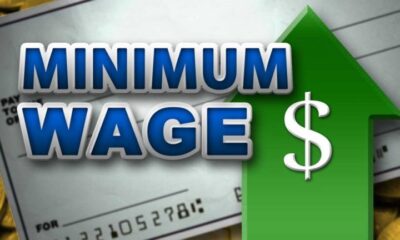

Strike Begins In FCT, Kaduna, Cross River, 3 Other States As Panel Meets Over Minimum Wage
-
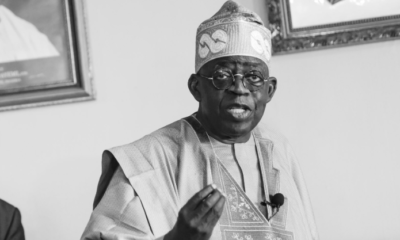

Good Life Nigerians Lived Before Petrol Subsidy Removal Was Fake — President Tinubu
-


President Tinubu Leaves France For South Africa Today To Co-Chair 11th Bi-National Commission
-
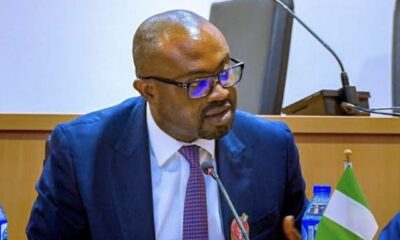

Interior Minister Tunji-Ojo Orders Probe Into Alleged Deductions From Salaries Of Paramilitary Officers
-
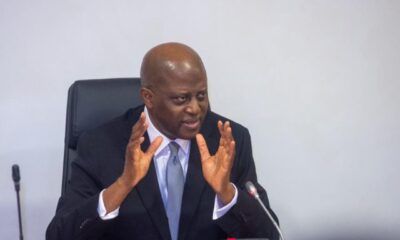

Central Bank Of Nigeria To Unveil “Comprehensive, Revamped” Website Today
BIG STORY
National Registration For All Hospitality And Tourism Practitioners Begins
Published
1 hour agoon
December 2, 2024
The National Institute for Hospitality and Tourism (NIHOTOUR) has launched the National Registration of Tourism Sector Personnel and Practitioners as of 1st December 2024. This initiative, in line with the NIHOTOUR Establishment Act 2022 (Gazette No. 3 of 2023), is aimed at regulating all personnel and practitioners within Nigeria’s hospitality and tourism sector.
Under the leadership of Aare Abisoye Fagade, FIMC, the Director General/CEO of NIHOTOUR, this comprehensive registration process extends beyond hotel staff to include all individuals and professionals involved in hospitality and tourism practices.
According to Aare Abisoye Fagade, the registration will remain free for the first six weeks. However, starting from the next quarter of 2025, a fee will be introduced. Aare Fagade has encouraged hotels and other stakeholders in the hospitality and tourism industry to take full advantage of this free registration window.
Registration is available at www.nihotour.gov.ng, and NIHOTOUR remains committed to professionalizing and elevating the standards of Nigeria’s hospitality and tourism industry.
BIG STORY
Strike Begins In FCT, Kaduna, Cross River, 3 Other States As Panel Meets Over Minimum Wage
Published
4 hours agoon
December 2, 2024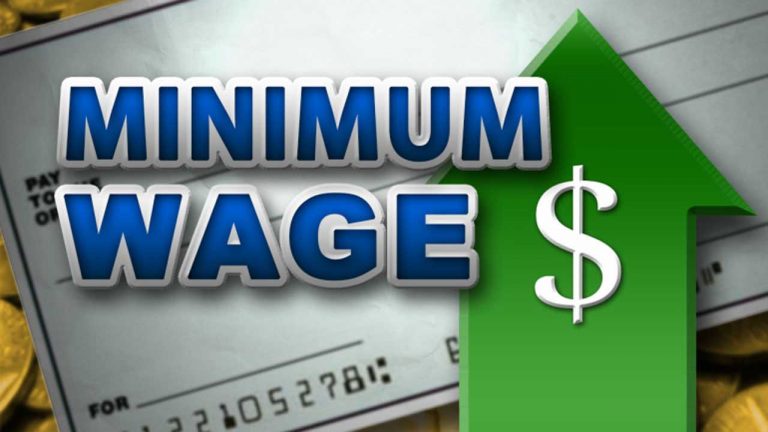
Barring any last-minute changes, workers in the Federal Capital Territory (FCT), Cross River, Nasarawa, Ebonyi, Kaduna, and Zamfara states may begin a strike on Monday (today) due to the failure of state authorities to negotiate the payment of the N70,000 new minimum wage.
Although implementation panels set up by the affected states have been meeting with labour leaders in an attempt to avert the strike, various state chapters of the Nigeria Labour Congress (NLC) have indicated their readiness to proceed with the industrial action starting today.
The FCT Council of the NLC had previously instructed workers in the six Area Councils to begin an indefinite strike on December 1, pending further instructions.
This was outlined in a letter signed by the Chairman of the FCT Council of the NLC, Stephen Knabayi, on Saturday.
The strike follows a directive from the NLC leadership for workers in 14 states and the FCT to take industrial action starting Sunday over the non-implementation of the new minimum wage.
Knabayi faulted the failure of the area council chairmen to respond to the demand for the implementation of the minimum wage, despite receiving the communique of the National Executive Council of the NLC dated November 14, 2024.
The Nasarawa State chapter of the NLC on Sunday declared its readiness to declare a strike if the minimum wage was not paid.
The state NLC Chairman, Ismaila Okoh, disclosed that a notice of strike had been issued to all the labour members.
He, however, revealed that the Nasarawa State government had reached an agreement with the union to pay N70,500 to the workers, adding that no document had been signed regarding the implementation.
He said, “We have notified all our members to embark on strike tomorrow (today) because of the non-implementation of the national minimum wage in the state.
“Although the minimum wage committee set up by the state government has agreed to start paying N70,500, no document has been signed to that effect up till this moment.
“So, we are observing the situation to see if the documents on the minimum wage will be signed before tomorrow morning. However, if nothing is done between now and midnight, our members will have to fully comply with the strike as they were directed.”
To avert a shutdown, the Kaduna State Government said it had commenced the implementation of the new national minimum wage, with the least-paid worker in the state receiving N72,000 as gross salary in November.
Many states agreed to pay above the N70,000 minimum wage, with Kaduna State offering its workers N72,000 as minimum wage.
Despite the positive development, the state chapter of the NLC confirmed its planned strike.
The state’s chairman of the NLC, Ayuba Suleiman, said the workers would embark on a strike as directed by the NLC leadership.
When asked if the NLC was prepared to embark on a strike, Suleiman replied, “Yes, we are set for the strike.”
However, a statement on Sunday by Ibraheem Musa, the Chief Press Secretary to Governor Uba Sani, insisted it was “a misrepresentation for the NLC to claim that the state has defaulted in the payment of the new minimum wage.”
Musa noted that the state government had complied with the letter of the National Minimum Wage Law.
“His Excellency, the Executive Governor of Kaduna State, Senator Uba Sani, has complied with the spirit and letter of the National Minimum Wage Law, by paying the lowest paid civil servant N72,000 last month,” he said.
He added that the NLC had been pushing for consequential adjustments but the state government argued that there was a difference between salary increments and the minimum wage.
Musa explained that the state government received an average of N8bn from the Federal Allocation and generated around N4bn monthly, totalling N12bn revenue.
However, he said with the implementation of the minimum wage, the monthly wage bill had increased from N5.4bn to N6.3bn, including N4bn deduction for loan payments every month.
This, he said, left only N2bn for rural transformation, healthcare, education, and other public services in the state.
“It will be unfair for Kaduna State Government to spend almost all its revenue on consequential adjustments, after paying the mandatory minimum wage.
“There are over 10 million people who are also entitled to the accrued revenue of Kaduna State. There are 84,827 civil servants in the state. So, it is unreasonable for the government to spend over 90 per cent of its revenue on just about one per cent of the population,” he added.
Musa urged the NLC to exercise patience over the consequential adjustments, pending when the state government’s revenue improved.
“Governor Uba Sani is labour-friendly. He has demonstrated this by providing buses for civil servants to commute to work free of charge, as part of the palliatives to cushion the prevailing economic challenges,” he said.
Meanwhile, the Chairman of the NLC in Ebonyi State, Dr Oguguo Egwu, disclosed that the state workers had been directed to join the ongoing industrial action from today.
According to him, the warning strike, which will last one week, was sequel to the failure of Governor Francis Nwifuru to implement the new national minimum wage.
He said, “Talking about the new national minimum wage as it concerns Ebonyi State, our governor on September 11 at the Ojiji festival of Izzi Kingdom announced the new minimum wage of N70,000 and we are all aware of that.
“We were very happy and excited that Ebonyi would be among the first states to implement the wage. But subsequently, there was no communication and no information.
“And we heard that the governor wanted to implement the national minimum wage without any due process of collective bargaining where both the workers and government angle would meet to agree on the consequential adjustment.”
Also, the Zamfara State NLC secretary, Ahmed Abubakar, said workers in the state had yet to receive the new minimum wage, and as such had no alternative but to join the strike.
He said, “We are going to join the strike as directed by the national body of our great union to express our anger over the non-payment of the new minimum wage.”
Abubakar, however, explained that the union would continue to dialogue with the state government on the issue.
The organised labour in Cross River is set for an industrial action over the non-implementation of the new minimum wage in the state.
The Cross River State Chairman of the Nigeria Labour Congress (NLC), Gregory Ulayi, disclosed that the union would embark on an indefinite strike if the state government failed to implement the new minimum wage to workers.
However, it was learnt that the state government reached an agreement with the state chapters of the NLC and TUC late on Sunday night to pay the N70,000 wage to its workers.
Calls to the NLC and TUC officials to clarify whether the state workers would still embark on strike were not answered as at the time of filing this report.
Credit: The Punch
BIG STORY
Good Life Nigerians Lived Before Petrol Subsidy Removal Was Fake — President Tinubu
Published
4 hours agoon
December 2, 2024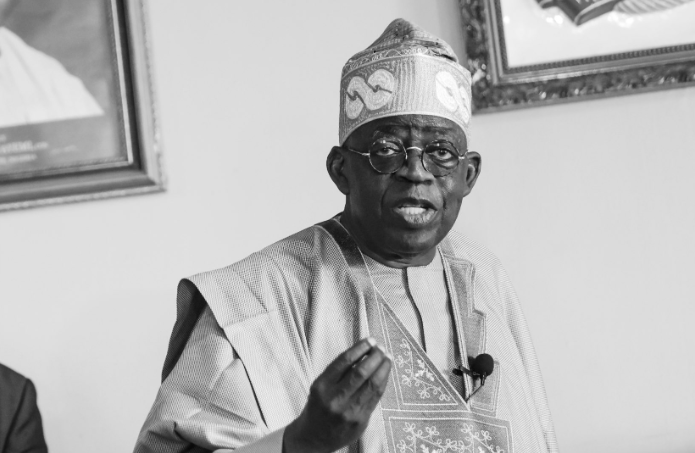
President Bola Tinubu says the good life that Nigerians thought they were living prior to his administration was fake and capable of collapsing the country.
Speaking on Saturday during the 34th and 35th combined convocation ceremonies of the Federal University of Technology Akure (FUTA) in Ondo state, Tinubu stated that the removal of the petrol subsidy and the unification of exchange rates were necessary to save Nigeria from the brink of collapse.
Tinubu announced the end of the petrol subsidy on May 29, 2023, during his inauguration.
The Central Bank of Nigeria (CBN) also announced the unification of all segments of foreign exchange markets.
The president, represented at the event by Wahab Egbewole, vice-chancellor of the University of Ilorin, said his administration took decisive action to avert economic disaster and secure the future of Nigerians.
“As you are all aware, we took the baton of authority at a time when our economy was nose-diving as a result of heavy debts from fuel and dollar subsidies,” Tinubu said.
“The subsidies were meant to support the poor and make life better for all Nigerians. We are all aware of the fact that the poor and average Nigerians were the sufferers of what was supposed to give them succour and improved standard of living.
“Unfortunately, the good life we thought we were living was a fake one that was capable of leading the country to a total collapse unless drastic efforts were urgently taken.
“The need to salvage the future of our children, and bring the country back from the brink of collapse necessitated the strategic decisions to remove the fuel subsidy and also unify the exchange rates. I am not unaware of the consequences of the tough decisions on our people. I sincerely wish there could be softer options.”
The president expressed optimism that the policies are already yielding positive outcomes.
He noted that the country’s macro-economic indicators are improving daily, while the micro-economy, which directly affects citizens, is gradually taking shape.
Tinubu added that Nigeria is transitioning from a consumption-driven economy to one focused on production across all aspects of human endeavours.
- ‘YOUTHS MIGRATION HAVE LED TO BRAIN DRAIN IN NIGERIA’
Tinubu called on the graduants to join hands with his administration “to recover our lost glory and virtues.”
The president also condemned the widespread migration of youths in search of “greener pastures,” stressing that the trend has led to significant brain drain in all sectors of the nation’s economy.
“Many of our youths have chosen the supposed easy option of emigrating to the proverbial greener pastures where their citizens had rolled up their sleeves to bring their nations back from the brinks in their times of trouble,” Tinubu said.
“Such inclination has led to the brain drain syndrome that we now experience in all areas of our endeavours as a nation.
“Our intellectuals and experts on whom the nation has massively invested huge resources to train in the interest of our country are migrating overseas in large numbers at a time their services are most required at home.
“It is heart-rending and the syndrome is not the solution to our problems. We are not Nigerians by accident, and I believe that the Almighty God who made us Nigerians has given us the required wisdom to turn things around for our betterment.
“The present challenges call for a high degree of patriotism and I can assure all Nigerians that there is light at the end of the tunnel. After rain comes sunshine. The brighter days are almost here.”
Tinubu said the renewed hope agenda is on track, assuring Nigerians that his administration will remain steadfast in its pursuit of a better and greater nation.
Most Popular
-

 BIG STORY2 days ago
BIG STORY2 days agoAbuja Herbalist Hospitalised After Shooting Self While Testing ‘Bulletproof’ Charm
-

 BIG STORY4 days ago
BIG STORY4 days agoPresident Tinubu To Name New Ambassadors After France, South-Africa Visits
-

 BIG STORY3 days ago
BIG STORY3 days agoAppeal Court Nullifies Rape Conviction Of Lagos Doctor Femi Olaleye
-

 BIG STORY2 days ago
BIG STORY2 days agoSimon Ekpa To Spend Christmas In Detention As Finland Court Denies Him Bail
-

 BIG STORY3 days ago
BIG STORY3 days agoUBA Group To Commence Full Banking Operations In France
-
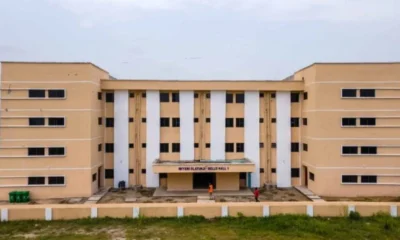
 BIG STORY5 days ago
BIG STORY5 days agoFirst Phase Of 10,800-Bed Hostel In LASU Ready — Tokunbo Wahab
-
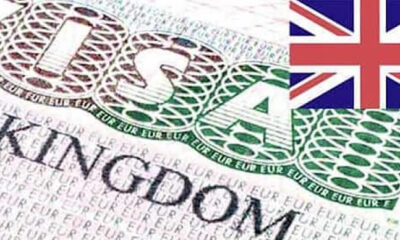
 BIG STORY4 days ago
BIG STORY4 days agoJAPA: UK Net Migration Falls By 20% Amid Visa Restrictions
-

 BIG STORY4 days ago
BIG STORY4 days agoFinnish Court Sets May 2025 Deadline For Ekpa’s Trial Amid Alleged Terrorism Case









